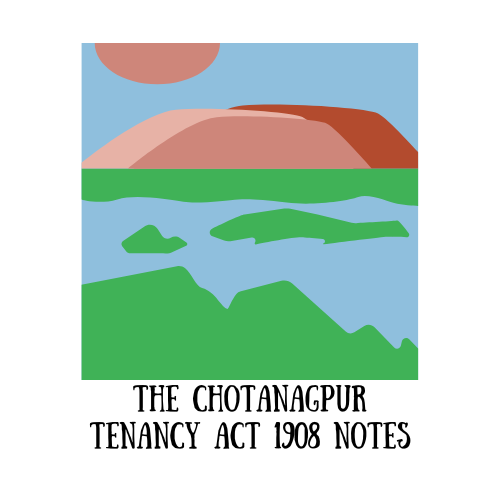Chotanagpur Tenancy Act 1908 Notes
Chotanagpur Tenancy Act 1908 Notes
Chotanagpur Tenancy Act 1908 Notes
Chotanagpur Tenancy Act 1908 Notes
Chotanagpur Tenancy Act 1908 Notes
Welcome to Law Adhoc Tutorials!
These notes are in easy language and easy to remember.
Law Adhoc Tutorials is an education platform. It helps law students get high quality notes to make their study easier. Law Adhoc Tutorials provides full and completes notes for free for each subjects of law.
Chotanagpur Tenancy Act 1908 NotesClasses of Tenants CNT Act 1908
Classes of tenants [section – 4]
The Chota Nagpur Tenancy Act, 1908
This Act may be called the Chota Nagpur Tenancy Act, 1908.It extends to [the North Chotanagpur, the South Chotanagpur and Palamau Divisions] including the areas or parts of the areas which have been constituted into a Municipality or a Notified Area Committee under the Jharkhand Municipal Act, 2002
Classes of Tenants CNT Act 1908 -Section – 4
There shall be, for the purposes of this Act, the following classes of tenants, namely :-
- tenure-holders, including under-tenure-holders;
- Raiyat, namely :-
- occupancy-raiyats, that is to say, Raiyats having a right of occupancy in the land held by them,
- non-occupancy Raiyats, that is to say, Raiyats not having such a right of occupancy, and\
- Raiyats having khunt-katti rights;
- under-raiyats, that is to say, tenants holding, whether immediately or mediately, under raiyats; and
- Mundari khunt-kattidars.
Meaning of a “tenure-holder” [ section – 5]
A “tenure-holder” is a person who has the right to hold land, either from the landowner or another tenure-holder. This right allows them to collect rent or cultivate the land by setting up tenants. The term also includes:
(a) the heirs of those who had this right, and
(b) people with tenures listed in the register under the Chota Nagpur Tenures Act of 1869.
However, this definition does not include a Mundari khunt-kattidar.
Tenure-holder when not liable to enhancement of rent [ section – 9]
A tenure-holder whose rent is fixed and has not changed since the Permanent Settlement cannot have their rent raised. This applies even if other laws, like the Bengal Decennial Settlement Regulation of 1793, suggest otherwise.
[9A. Enhancement of rent of tenure-holder or village headman.]
Regarding the enhancement of rent for a tenure-holder or village headman:
- Application for Enhancement: If the rent is subject to increase during the tenancy, the enhancement must be ordered by the Deputy Commissioner or a Revenue Officer, based on an application.
- Limits on Enhancement: Any rent increase must align with customary rates for similar tenancies in the area or, if no such rate exists, must be considered fair and equitable. When determining this, the origin and history of the tenancy should be taken into account.
- Periodicity of Enhancement: Once the rent has been raised, it cannot be increased again for fifteen years unless authorized by a Revenue Officer.
- Exemptions: This section does not apply to temporary tenure-holders or those whose rent can vary based on the terms of the tenancy contract.
This framework aims to protect the rights of tenure-holders while ensuring that any necessary rent adjustments are made fairly and judiciously.
Certain bhuinhars not liable to enhancement of rent [ section – 10]
No bhuinhar whose lands are entered in any register prepared and confirmed under the Chota Nagpur Tenures Act, 1869 (Ben. Act 2 of 1869) shall be liable to any enhancement of the rent of his tenure.
Registration of certain transfers of tenures [ section – 11]
When a tenure is transferred by succession, sale, gift, or exchange, the following rules apply:
1.Registration Requirement: The new owner must register the transfer with the landlord to whom the rent is payable.
- Landlord’s Approval: The landlord must approve the registration unless there is a valid reason to deny it.
3.Registration Fees: The landlord can charge:
– 2% of the annual rent (minimum one rupee, maximum one hundred rupees) for tenures with payable rent.
– A fee of two rupees for tenures without payable rent.
4.Registration Deadline: If the transfer isn’t registered within one year and the fee isn’t paid, the new owner cannot claim any due rent for that period through legal means.
- Transfer Limitations: This section does not validate transfers that are non-transferable by law or custom, nor does it affect the landlord’s right to reclaim resumable tenures.
In Arbind Giri vs. State of Bihar, the Supreme Court addressed tenant rights under the Chota Nagpur Tenancy Act, 1908. The court emphasized that landlords must follow legal procedures for eviction and that any transfer of tenancy rights requires proper registration. It also highlighted that customary practices must align with statutory provisions to be valid. This case underscores the judiciary’s role in protecting tenant rights under the Act.
Chotanagpur Tenancy Act 1908 Notes Chotanagpur Tenancy Act 1908 Notes Chotanagpur Tenancy Act 1908 Notes
All subjects law notes : https://lawadhoctutorials.com/category/subject/
Landmark cases : https://lawadhoctutorials.com/category/case-laws/
Legal Maxims : https://lawadhoctutorials.com/legal-maxims/
Penology and Victimology Notes : https://lawadhoctutorials.com/penology-and-victimology-notes/
Penology and Victimology Notes PDF : https://lawadhoctutorials.com/penology-and-victimology-notes-pdf/


